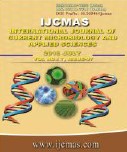


 National Academy of Agricultural Sciences (NAAS)
National Academy of Agricultural Sciences (NAAS)

|
PRINT ISSN : 2319-7692
Online ISSN : 2319-7706 Issues : 12 per year Publisher : Excellent Publishers Email : editorijcmas@gmail.com / submit@ijcmas.com Editor-in-chief: Dr.M.Prakash Index Copernicus ICV 2018: 95.39 NAAS RATING 2020: 5.38 |
Wheat (Triticum aestivum L.), a staple food crop is of great commercial importance. Its production is restricted due to various abiotic stresses. There are indications that the wheat production is consistently limited by terminal heat stress. Here, performance of forty genotypes of wheat was undertaken for assessment of direct selection parameters (variability, heritability and genetic advance) and their relation with heat tolerance. The plants were sown in late planting (first fortnight of December) to expose them to terminal heat stress. Observations were recorded on fourteen morpho-physiological traits i.e. days to heading, days to maturity, grain filling duration, number of tillers per plant, spike length, grain yield per plant, 1000-kernel weight, CTD-I, CTD-II, CTD-III, NDVI-I, NDVI-II, NDVI- III and membrane thermostability. High heritability associated with high genetic advance reflected for physiological traits like canopy temperature depression and membrane thermostability. That indicated effectiveness of selection for the improvement of these traits. Moderate estimate of genetic advance (25%-50%) exhibited for number of tillers per plant, NDVI I, CTD (I & II) and spike length. For all the morpho-physiological traits studied, the estimates of phenotypic variance were exhibited higher than their corresponding genotypic variances, indicating the influence of environment on the expression of these morpho-physiological characters were observed. These finding suggests the relative importance of various physiological traits in formulating the selection criteria for developing thermotolerant wheat cultivars.
 |
 |
 |
 |
 |